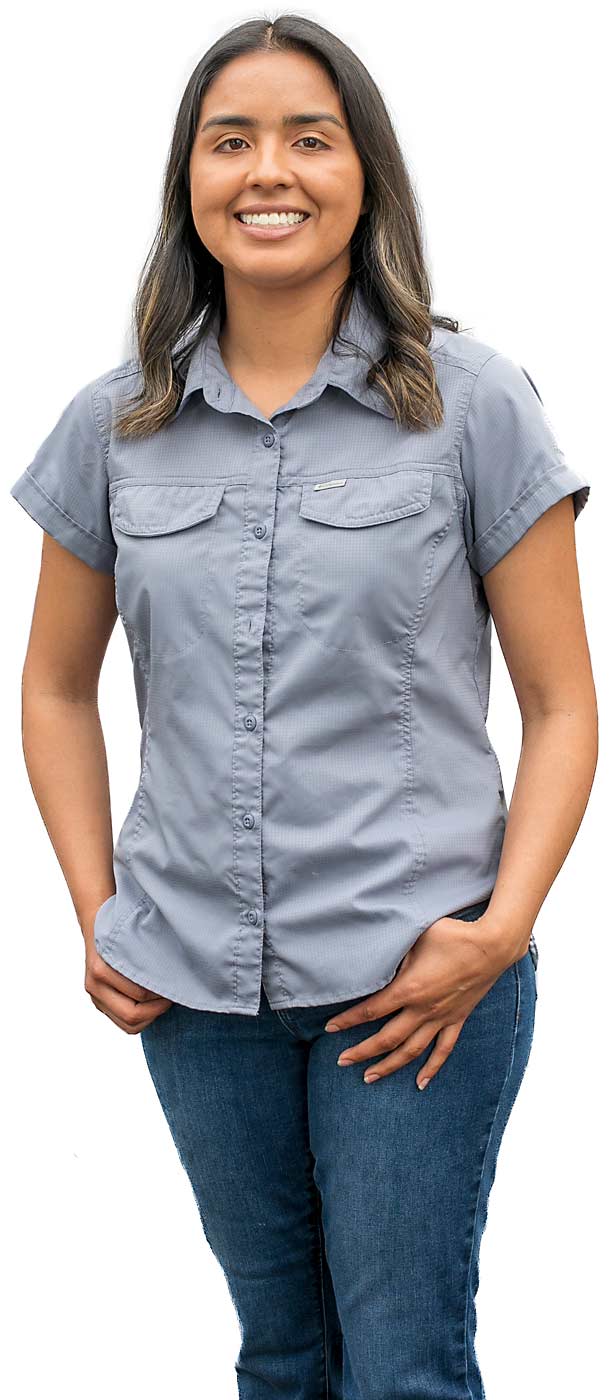family background/ Leticia graduated from Washington State University with a degree in agricultural food systems. She is married to Marc Martinez and is the daughter of Diana and Donato Trejo.
age/25
grower/Bridgeport, Washington
crops/Tree fruit, grapes and hops
business/Fieldin

How did you get your start?
When I started looking for jobs after college, I took a big leap and moved out of state because I wasn’t all that sure what I wanted to do. The position was in row crops, and that was completely different than what I grew up around. After a couple months, I didn’t like it and came home to look for jobs in tree fruit around the Yakima and Wenatchee valleys.
What have you learned about finding the right job?
I wasn’t sure what I wanted to do after returning to Washington, and the first job that I took was a new position. I didn’t know what I was getting into and neither did the company — because it was new to them, too. It turned out great, but by the time another job opportunity came up, I knew that I should ask more questions such as: what the expectations are; getting a more detailed job description; who am I working for; and other basic things like when the office hours were.
For my second tree fruit job, I asked questions like, what is my summer going to look like, or during cherry and apple harvest? I planned to know whether I’d be waking up at 4 in the morning, because I was going to ask those questions beforehand.
Now, when I had an opportunity to join Fieldin, I made sure to ask questions that I didn’t consider the first couple times, such as what kind of health insurance was available, paid time off, sick days and vacation time.
These were things I didn’t think about when I was 18 years old. Now that I’ve got a family and have other commitments outside of work, I looked closer at some of the human resources-related questions. What I’d advise other young persons looking into a new job opportunity is to understand what the expectations are from your employer — make sure you know what they want from you and that you can accomplish those goals.
What have you learned by having such different roles?
Starting out in my career in postharvest, I was doing a lot of data collection. I was trying to improve the consumer’s experience with pears. And then I moved onto the field side where I thought there might be opportunities to improve the things I saw in postharvest.
After I joined the field team, I learned it wasn’t as easy to correct some of the postharvest problems as I thought it was. There were a lot of factors I wasn’t taking into consideration when I was in the office.
In one case, there were pears with psylla damage, and when I was in postharvest I’d wonder why it wasn’t being addressed at the field level. When I moved to field staff, I learned it’s hard to control the pest and that orchard practices cannot remove it 100 percent of the time.
What’s an example of a tech challenge you’ve faced?
In one of my jobs, I had a scouting tool where workers would take pictures of the crops while walking the fields. If they sent in soil or tissue samples, they would need to include dropped pins for the location — because as results came back, they could tell where the sample was taken from.
There were some employees who were reluctant to use the iPads, saying they left it in their pickups or in the office, or forgot usernames and passwords when they got out into the field. Those were some of the common struggles when integrating tech into farming.
What advice do you have for people looking at ag tech careers?
It would be helpful to understand the whole system from farm to packing. If you have an opportunity to take an internship in something that’s not what you think you want to do, I’d suggest you take it.
You’ll learn from it and maybe apply what you learned later on in a different ag tech job. Take all the opportunities that you can to learn about food production in all aspects. All experiences can be useful if you’re interested in tech careers.
—TJ Mullinax






Leave A Comment